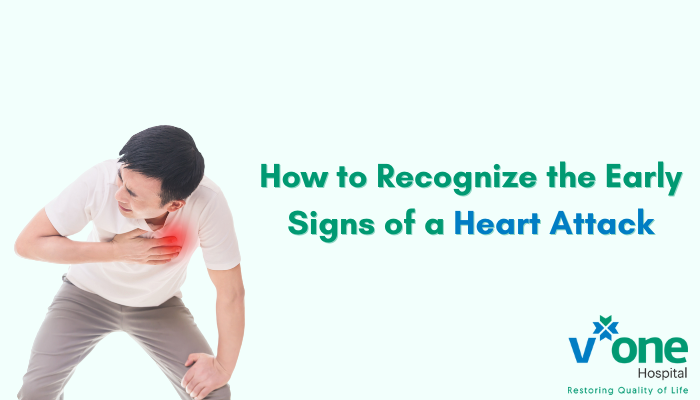How to Recognize the Early Signs of a Heart Attack
Heart disease remains one of the leading causes of death globally. Yet, many people still miss the early warning signs of a heart attack. Often, it’s because the symptoms are subtle, ignored, or confused with other less serious issues. Recognizing these early signs can be life-saving, not only for you but also for your loved ones.
Let’s explore how to identify the early signs of a heart attack and what to do if they appear.
Why Recognizing Early Signs Matters?
Time is critical when it comes to treating a heart attack. The earlier you receive treatment, the greater the chances of survival and less heart damage. But many heart attacks don’t happen the way they do in movies—suddenly and dramatically. Some begin slowly, with mild discomfort. That’s why knowing the signs, especially the subtle ones, is key.
Common Early Signs of a Heart Attack
1. Chest Discomfort
This is the most classic and commonly known symptom. You might feel pressure, tightness, squeezing, or pain in the center or left side of your chest. It usually lasts more than a few minutes or comes and goes.
It’s not always a sharp pain. Some people describe it as a “heavy weight” sitting on the chest or an uncomfortable fullness.
2. Discomfort in Other Areas of the Upper Body
A heart attack doesn’t just affect the chest. You may also feel pain or discomfort in:
- One or both arms
- The back
- Neck or jaw
- Shoulders
- Upper stomach (can be mistaken for heartburn)
This discomfort can feel dull, heavy, or sharp and may radiate or stay localized.
3. Shortness of Breath
This might occur before or along with chest discomfort. You might feel out of breath even without exertion. Climbing a single flight of stairs or walking short distances might leave you unusually winded.
4. Sweating
Sudden, cold, or clammy sweating is another red flag. If you break into a sweat without any reason—especially if other symptoms accompany it—take it seriously.
5. Nausea or Lightheadedness
Some people feel sick to their stomach, vomit, or feel dizzy during a heart attack. These symptoms are more commonly reported in women, but men can experience them too.
6. Fatigue
Unusual or extreme fatigue, especially in women, may develop days or even weeks before a heart attack. If you’re suddenly feeling drained, even after a good night’s sleep, your body might be trying to tell you something.
Heart Attack Symptoms in Women
While chest pain is still the most common symptom in both men and women, women are more likely to experience:
- Shortness of breath
- Nausea or vomiting
- Back or jaw pain
- Unexplained anxiety
- Dizziness or fainting
- Pressure in the upper abdomen
Because these symptoms are often more subtle, many women delay getting medical help.
What to Do if You Notice Symptoms?
- Don’t ignore the warning signs. If you or someone around you is experiencing symptoms that could indicate a heart attack:
- Call Emergency Services (e.g., 108 in India) immediately – Do not drive yourself.
- Chew an Aspirin – If recommended by a doctor and you’re not allergic. It helps prevent blood clotting.
- Stay Calm – Sit down, stay still, and wait for emergency personnel.
Remember: It’s better to get help and find out it was a false alarm than to ignore real signs.
Who Is at Risk?
While a heart attack can happen to anyone, the risk is higher if you:
- Have high blood pressure, cholesterol, or diabetes
- Smoke
- Are overweight or inactive
- Have a family history of heart disease
- Are under constant stress
- Eat a diet high in saturated fats and processed foods
Can You Prevent a Heart Attack?
Yes, many heart attacks are preventable. Simple lifestyle changes can significantly lower your risk:
- Eat a heart-healthy diet (rich in fruits, vegetables, lean proteins, and whole grains)
- Exercise regularly—30 minutes a day, most days of the week
- Quit smoking
- Limit alcohol
- Manage stress
- Monitor blood pressure, cholesterol, and blood sugar
- Get regular checkups with your healthcare provider
If you have a family history of heart issues or other risk factors, talk to a heart specialist in Indore for a tailored prevention plan.
When Should You See a Heart Specialist?
Even if you haven’t experienced symptoms, it’s wise to visit a cardiologist or heart specialist if:
- You have a family history of heart disease
- You are over 40 with risk factors like smoking or diabetes
- You experience recurring chest discomfort, breathlessness, or fatigue
Early screening and tests such as ECGs, stress tests, or cholesterol checks can reveal hidden risks.
Final Thoughts
Your heart sends signals when something isn’t right—don’t ignore them. Whether it’s tightness in the chest, unusual fatigue, or shortness of breath, your body is asking for attention.
Recognizing the early signs of a heart attack and acting quickly can save your life or someone else’s. Stay aware, take preventive steps, and don’t hesitate to seek help.

